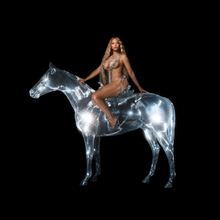
Beyoncé’s seventh studio album, Renaissance, has an edge none of her previous studio albums do. Where, for example, 2016’s Lemonade feels overall somber, and 2008’s I Am…Sasha Fierce has more of a mellow, singer-songwriter vibe, Renaissance bites from beginning to end. Before Beyoncé’s signature voice enters the soundscape, the late Princess Loko — a heretofore unrecognized talent in the Memphis rap scene whose flow is an irreplaceable contribution to Southern, underground rap music — sets the tone for the listener’s journey with a smoldering refrain; “Please, mothafuckers ain’t stoppin’ me.” It’s the kind of vibe you get when someone picks the right one on the wrong day; they tried it, and now they gon find out. From the get, it is clear that this album isn’t just about Bey, it’s about all of us. And by “all of us,” I mean everybody Black.
If you’re strolling down the street with Renaissance’s opening track, “I’M THAT GIRL,” in your ears, you might find your stride a little wider, with a little more swagger in your step. In these first moments of the album we are all, “that girl,” regardless of whether we identify as being “that girl” in everyday life or not. We are confident, beautiful, taking up space, and most importantly, unbothered. By the time we’ve reached peak bad-bitch status, the catchy rhythm of “COZY” beckons us to walk, honey. This album, more than any of Beyoncé’s previous albums, was made to make us dance. And dance, we do. Spontaneously, but not unwillingly, we’re serving hand performance, and if our knees are up for it (let’s goooo, older millennials and gen-Xers), we’re duck-walking and dipping. The first six tracks of the album constitute a good 20 minutes of cardio if we’re into it, and…we are into it. When we hit the break-out single of the album, “BREAK MY SOUL,” featuring “The Queen of Bounce,” Big Freedia, we’re sweating out our frustrations as we wiggle toward catharsis — per Freedia’s instruction.
Just in time for us to catch our breath and the Spirit, “CHURCH GIRL” is the first of a handful of songs that keep us bopping but offer a more relaxed BPM than the songs prior. The Clark Sisters’ clear and stirring 1981 gospel song, “Center of Thy Will,” which is sampled in this son, provides a juxtaposition to the groove and lyrics that remind us we’re here to slay through the trials and tribulations of life. As a bridge to the album, we do get a classic Beyoncé ballad in “PLASTIC OFF THE SOFA.” It doesn’t slow all the way down, but it maintains a softness that is a just balance to the tracks that surround it, giving listeners a chance to revel in a more breathy expression of Beyoncé’s voice.
The beat comes back hard as the pace picks up in “MOVE,” featuring the voices of dance club and fashion icon Grace Jones and Nigerian pop star Tems. Roll down the waistband of your shorts and tie a knot in your tee-shirt, because this song sends our hips circling in a slippery wine as Beyoncé and her crew invite Afropop and dancehall influences to the forefront of this section of the album.
As the album rounds the corner toward the finish, we are welcomed to dip into darkness again with the opening near-whispers of “THIQUE.” With lyrics like, “He thought he was loving me good, I told him, ‘Go harder,’” you *might* find yourself listening to this track a disrespectful amount of times as you put some respect on your stripper name, whether she makes an appearance on that (metaphorical or literal) stage every night or not. This song isn’t all dripping wet, though. In no time, our back-hook-spin on the pole meets the floor where we shuffle-and-dodge through the house-inspired beat that follows.
When the second-to-last track begins, we are stretched, warm, and ready to throw shade and battle for the title of top bitch. “PURE/HONEY” calls everyone to the ballroom floor: bad bitches, money bitches, pretty boys, and whoever else might be in the room. Drag legend Kevin Aviance’s 1999 club hit “Cunty” provides a perfect milieu for every expression of vogue from “Old Way” to “Soft and Cunt.” But before things get too heated, Beyoncé offers to send us off with pure sparkle in the album’s final song, “SUMMER RENNAISANCE,” which uses Donna Summer’s 1977 hit “I Feel Love” as a backdrop. Holding hands with our crush, we’re skating off into the magical glare of the disco ball as the last notes fade into the ether.
Whew. I don’t know about you, but I need a drink of water. Though Renaissance may not have the lyrical gravitas of her last album, Lemonade, the significance of this work comes through in the referential material in the album, and how it is used. Beyoncé and her producers clearly did their homework. From the range of samples to the rhythmic and tonal journey of the album, we get a crash course in Black popular and underground music from gospel to bounce, house to disco, funk to rap, dancehall to Afrobeats, and more. If one has the desire, listening to all of the source material for the album is an incredible journey. I recommend it. It is a rabbit hole of the best kind. Renaissance demonstrates the iterative nature of Black culture(s) and its incredible influence in the United States and around the world. Beyoncé uses her visibility to shine a light on artists and movements that remain obscure to mainstream audiences. And it’s good fun to boot.
Beyoncé’s Renaissance Beckons Us to Walk, Honey: A Celebration of Black Music and Culture was originally published in ANMLY on Medium, where people are continuing the conversation by highlighting and responding to this story.
